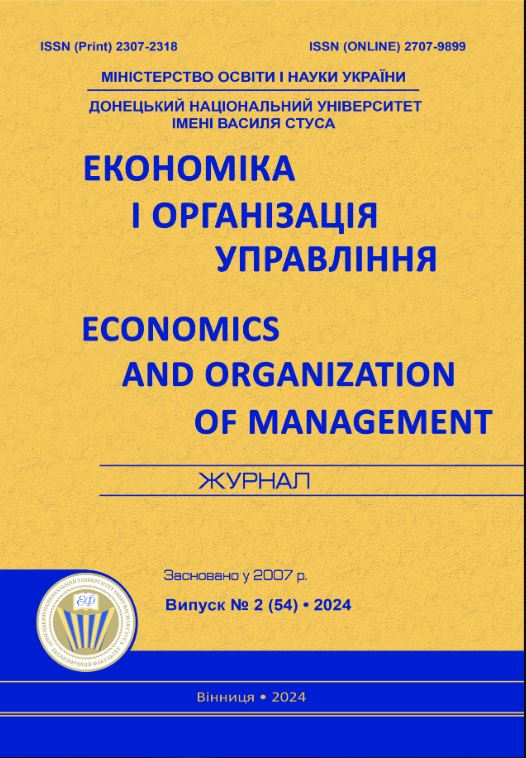Remote and hybrid personnel management models: a theoretical review and content analysis
DOI:
https://doi.org/10.31558/2307-2318.2024.2.9Keywords:
Remote personnel management, hybrid management models, personnel management, content analysis, global crisesAbstract
This paper provides a comprehensive theoretical review and content analysis of remote and hybrid personnel management models, which have gained particular relevance in the context of global crises such as the COVID-19 pandemic, military conflicts, and environmental and climate disasters. The impact of these models on labor productivity, employee satisfaction, and corporate culture is investigated. Challenges related to the implementation of new technologies, ensuring cybersecurity, and managing talents in remote and hybrid work environments are explored.
The main aim of this paper is to identify the advantages and disadvantages of remote and hybrid personnel management models and to provide recommendations for their effective implementation. The study takes into account the latest research findings that emphasize the importance of adapting HR practices to new working conditions and developing leadership skills oriented towards managing remote teams. Various approaches to supporting corporate culture and employee motivation in the new conditions are considered.
The paper presents a comparison of the main components of remote and hybrid personnel management models, including the use of technology, flexible work schedules, productivity, cybersecurity, talent management, support for corporate culture, and employee satisfaction. Practical recommendations are proposed for organizations implementing these models to enhance their effectiveness and competitiveness.
References
Nyika, F., & Chipaike, A. (2024). The implications of remote work on business-to-business (B2B) customer engagement at a South African technology company. URL: https://www.researchgate.net/profile/Farai-Nyika-2/publication/380356295_The_Implications_of_Remote_Work_On_Business-To-Business_B2B_Customer_Engagement_at_a_South_African_Technology_Company_X/links/6639cff27091b94e93f5e0eb/The-Implications-of-Remote-Work-On-Business-To-Business-B2B-Customer-Engagement-at-a-South-African-Technology-Company-X.pdf
Piteira M., Duarte R., Carneiro Pinto J. & Cervai S. (2024). «When Covid-19 Came to Town: Remote Work and Human Resources Challenges by the Organisational Practices of the Portuguese Institutions». Socius Working Papers. URL: https://socius.rc.iseg.ulisboa.pt/RePEc/soc/wpaper/wp012024.pdf
Gurung, S. (2024). A study of changing HR practices at workplace after COVID-19 pandemic. URL: https://www.kuey.net/index.php/kuey/article/download/5007/3437
Burton, S. L. (2024). Securing tomorrow: Synergizing change management and cybersecurity in the digital era. URL: https://sciendo.com/pdf/10.2478/hjbpa-2024-0001
Lakshmi, G. V., Dutta, M., & Kumar, P. (2024). Technology used in talent management to provide employee experience at workplace. URL: https://pubs.aip.org/aip/acp/article-abstract/3164/1/040007/3295273
Haatainen, T. (2024). Remote leadership in Finnish E-commerce companies during and after the Covid-19 pandemic. URL: https://oulurepo.oulu.fi/bitstream/handle/10024/50353/nbnfioulu-202406104319.pdf?sequence=1
Samy, C. R. A. (2024). The post pandemic impact towards employee engagement: A study to investigate the influence of rewards and working environment of employees in Klang Valley. URL: https://myjms.mohe.gov.my/index.php/ijbtm/article/view/26905
Amri, A. (2024). Trends in human resource management and organizational behavior. URL: https://ojs.stieamkop.ac.id/index.php/ecotal/article/download/1374/961
Choudhary, N., & Jain, S. (2024). A systematic literature review to explore the antecedents of employee engagement among remote workers. URL: https://www.emerald.com/insight/content/doi/10.1108/JWAM-11-2023-0136/full/pdf
Van Os, E. (2024). Security in the hybrid organisation. In E. Van Os (Ed.), Hybrid Work (pp. 102-117). URL: https://www.taylorfrancis.com/chapters/edit/10.4324/9781003387602-6/security-hybrid-organisation-elsine-van-os
Vartiainen, M. (2024). Towards flexible hybrid work. In M. Vartiainen (Ed.), Flexible Work (pp. 52-66). Retrieved from URL: https://www.elgaronline.com/monochap/book/9781035320103/book-part-9781035320103-11.xml
Sereda, H. (2022). Problems and prospects for the development of remote HRM in Ukraine in the war and post-war period. Social and Labour Relations: Theory and Practice, 12(1), 50-61. URL: https://doi.org/10.21511/slrtp.12(1).2022.05

